Tag: best dental implants

Smoking and Dental Implants: Can You Have Both?
May 3, 2024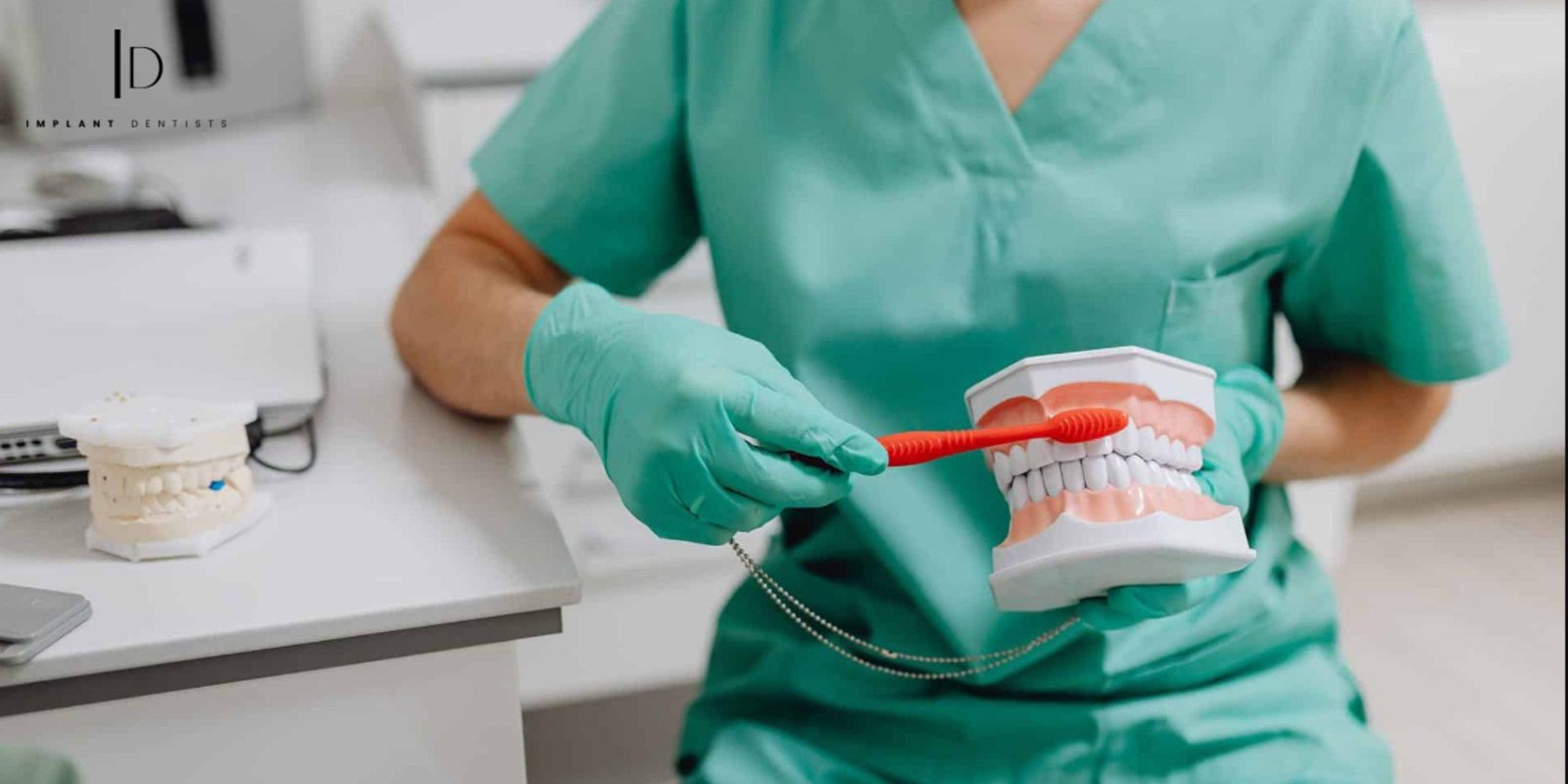
Affordable Dental Implants | Finding Cheap Solutions for Fixed Teeth in the UK
March 11, 2024When addressing the issue of missing teeth, the evolution of dental technology has introduced a diverse array of replacement options. Among which fixed teeth solutions, specially the groundbreaking all the four implants, stand out. This innovative affordable dental implant procedure has revolutionized the field of tooth replacement, offering people’s in the United Kingdom an exceptional alternative through proficient affordable dental implant, particularly those practicing in Crewe.
Understanding Teeth Replacement
Replacing missing teeth is a vital aspect of modern dentistry, allowing people’s to restore oral functionality and regain confidence in their smiles. In the United Kingdom, specifically in Crewe, expert the implant dentists offer advanced solutions for tooth replacement, ensuring patients receive top-tier care and advanced implantology techniques.
- Traditional Dental Implants: Dental implants are titanium posts surgically inserted into the jawbone, serving as sturdy foundations for attaching replacement teeth. This method ensures stability and durability comparable to natural teeth.
- Fixed Teeth Solutions: Fixed teeth involve implant-supported prosthetics permanently affixed in the mouth, providing a secure and functional tooth replacement option.
Benefits of Teeth Replacement
- Restored Functionality: Replacing missing teeth restores the ability to chew food properly, improving digestion and overall nutrition. This enhances oral functionality, allowing for comfortable eating and speaking.
- Protecting of Jawbone Density: When teeth are missing, the jawbone can start to deteriorate due to lack of stimulation. Dental implants and other replacement options stimulate the jawbone, preserving its density and preventing bone loss.
- Prevention of Teeth Shifting: Gaps left by missing teeth can cause adjacent teeth to shift or become deranged over time. Tooth replacement prevents this shifting, maintaining the proper alignment of remaining teeth.
- Improved Oral Health: Filling the gaps left by missing teeth prevents food particles and bacteria from store in those spaces, reducing the risk of gum disease, decay, and further tooth loss.
Exploring All of Four Implant
In the United Kingdom, implant dentists in Crewe, specializing in all four implant, offer expert care and clarity in this advanced dental procedure. These dental professionals in Crewe possess extensive experience and specialized training in planetology, ensuring patients receive quality treatment and personalized care. This innovative technique involves securing a full set of teeth onto just four strategically positioned implants per dental arch. Its efficiency and reduced invasiveness make it a popular and cost-effective alternative to conventional implant procedures.
Benefits All of Four Implant
- Immediate Functionality: All the four implant allow for the attachment of a full set of teeth to just four strategically placed implants per dental arch. This often enables immediate loading, providing patients with functional teeth shortly after the procedure.
- Cost-Effective Option: All the four implant can be a cost-effective solution for full-arch restoration. The procedure utilizes fewer implants and can often avoid the need for additional bone grafting surgeries, reducing overall treatment expenses.
- Improved Stability: The strategic placement of implants in all of four implant provides stability and support for the prosthetic teeth. This stability enhances chewing and speaking abilities, offering a more comfortable and functional dental experience.
Cheap Dental Implants in the UK
For people’s in the United Kingdom seeking budget-friendly yet high-quality dental implants, several options exist to access cheap dental care. Among these choices, implant dentists in Crewe, UK, stand out for their expertise in providing cost-effective dental implant solutions. In the UK, cheap dental implants are accessible through various clinics and specialized practices. The Implant dentists, offer quality dental implant treatments at competitive prices, ensuring that cost doesn’t compromise the quality of care.
Implant Dentists in Crewe
Implant dentists in Crewe, UK, are highly skilled professionals specializing in providing advanced dental implant treatments and solutions. Renowned for their expertise and commitment to excellence, these practitioners play a pivotal role in restoring smiles and improving oral health for individuals seeking tooth replacement options.
- Expertise and Specialization: Affordable dental implant, Crewe possess extensive expertise in advanced dental implant techniques. Their specialization ensures patients receive top-tier care and precision in implant-related procedures.
- Personalized Consultation: These professionals conduct thorough assessments and create personalized treatment plans tailored to individual patients. This take into account their unique needs, preferences, and budget constraints.
Benefits of Dental Implants:
- Enhanced Functionality: Implants function just like natural teeth, allowing persons to chew, bite, and speak comfortably without restrictions. This restoration of natural dental function improves overall quality of life.
- Improved Aesthetics: Dental implants closely resemble natural teeth, providing a seamless and aesthetically pleasing appearance. They blend harmoniously with the surrounding teeth, restoring a confident smile.
- Restored Functionality: Dental implants facilitate comfortable biting, chewing, and speaking, closely mimicking natural teeth.
- Boosted Confidence: Restoring a complete smile with dental implants often leads to increased self-confidence. A better self-image, positively impacting social interactions and overall well-being.
- Enhanced Aesthetics: They offer a natural-looking solution for missing teeth, enhancing smiles and restoring confidence.
- Enhanced Oral Health: Implants do not require alterations to nearby teeth, unlike dental bridges. This preservation of natural teeth promotes better oral health in the long run.
Conclusion:
Tooth replacement options, especially fixed teeth solutions like all of four implants, present viable alternatives for individuals seeking durable and reasonably priced dental treatments in the UK. This allows dental implant procedures accessible and tailored to the specific needs of each patient. Through these innovative solutions, people’s can regain their smiles and enjoy improved oral health and functionality.

Bridge to Confidence | Exploring Bridge Tooth Implants and Replacement Teeth
February 29, 2024Losing a tooth can be an unsettling experience, impacting not only your smile but also your confidence and oral health. Fortunately, advancements in dental technology have introduced various solutions to restore missing teeth, including bridge tooth implants and replacement teeth. We’ll explore everything you need to know about these options, from their benefits to the procedure and aftercare.
What are Bridge Tooth Implants and Replacement Teeth?
Bridge tooth implants and replacement teeth are advanced artificial solutions carefully crafted to seamlessly integrate into your smile. To join advanced dental technology with precision craftsmanship, these innovations fill the gaps left by missing teeth. They renew your confidence and oral well-being in the process. Engineered for durability and comfort, they provide a permanent fix that harmonizes with your natural teeth. This ensures seamless functionality and a radiant smile for years to come.
Bridge Tooth Implants
These bridges are constructed from high-quality materials, such as porcelain, ceramic, or resilient metal alloys. They offer exceptional strength and durability. The materials used in these bridges are not only strong but also carefully chosen. They harmonize with the surrounding teeth, ensuring a seamless blend within your smile.
Replacement Teeth
Replacement teeth border a diverse array of solutions tailored to various dental needs. Dentures are one of the most common options for replacing multiple missing teeth. They are removable prosthetic devices that provide functional and aesthetic restoration. Dentures come in two forms, full dentures for entire arches of missing teeth, and partial dentures designed to fill gaps caused by the absence of one or more teeth in specific areas of the mouth.
Dental implants stand out as a remarkable advancement in dental technology. These implants serve as artificial tooth roots surgically implanted into the jawbone. They offer a robust foundation for replacement teeth, whether it’s a single tooth or multiple teeth. Dental implants provide a permanent and stable solution, mimicking the natural tooth structure and function with exceptional durability and longevity.
Benefits of Bridge Tooth Implants and Replacement Teeth
- Restored Functionality: Bridge tooth implants and replacement teeth enable you to chew, speak, and bite properly, restoring full functionality to your mouth.
- Improved Aesthetics: These prosthetic solutions replicate the appearance of natural teeth, enhancing the aesthetics of your smile and boosting self-confidence.
- Prevents Dental Issues: Replacing missing teeth helps prevent dental problems such as shifting of adjacent teeth, bone loss, and temporomandibular joint disorders.
- Long-Term Solution: Bridge tooth implants and replacement teeth are durable and long-lasting, providing a reliable solution for missing teeth that can last for many years with proper care.
- Preserves Facial Structure: Dental implants help preserve bone density in the jaw, preventing the deterioration of facial structure associated with tooth loss.
Procedure for Bridge Tooth Implants and Replacement Teeth
- Consultation: The process begins with a consultation with your dentist or prosthodontist to assess your oral health and discuss treatment options.
- Treatment Planning: We develop a personalized treatment plan for you, taking into account your specific needs and preferences, considering the number of missing teeth, evaluating the condition of your remaining teeth, and keeping your overall oral health in mind.
- Preparation: For bridge tooth implants, the adjacent teeth serving as abutments are prepared by reshaping them to take in the dental bridge. For replacement teeth supported by dental implants, implant placement surgery is performed to anchor the artificial tooth roots in the jawbone.
- Fabrication: After preparing the abutments or placing dental implants, the dentist takes impressions of your mouth. They then fabricate custom-made bridge tooth implants or replacement teeth. The new teeth are made to match the colour, shape, and size of your natural teeth.
- Placement: The bridge tooth implants or replacement teeth are securely attached to the abutments or dental implants, restoring your smile and functionality.
- Follow-Up Care: After the procedure, you’ll receive instructions on how to care for your new teeth and maintain good oral hygiene to ensure long-term success.
Aftercare for Bridge Tooth Implants and Replacement Teeth
- Practice Good Oral Hygiene: Brush your teeth twice a day, floss daily, and rinse with an antimicrobial mouthwash to keep your mouth clean and free of bacteria.
- Attend Regular Dental Check-ups: Schedule regular follow-up appointments with your dentist. Have routine examinations and professional cleanings done to monitor the health of your bridge tooth implants or replacement teeth.
- Avoid Hard Foods: Be cautious when eating hard or sticky foods that could damage your prosthetic teeth or dental implants.
- Quit Smoking: Smoking can increase the risk of complications for bridge tooth implants or replacement teeth. Consider quitting smoking to improve the success rate.
- Protect Your Teeth: If you participate in activities that could potentially harm your teeth, such as contact sports, wear a mouth guard. To protect your prosthetic teeth and dental implants, wear a mouth guard during contact sports.
Conclusion
Bridge tooth implants and replacement teeth offer effective solutions for replacing missing teeth and restoring your smile. If you choose a dental bridge or dental implants, these prosthetic devices can significantly improve your oral health. They can also enhance your function and aesthetics. If you’re considering bridge tooth implants or replacement teeth, consult with a qualified dentist or prosthodontist. They can help you explore your options and create a treatment plan tailored to your needs. With proper care and maintenance, you can enjoy a beautiful, functional smile for years to come.
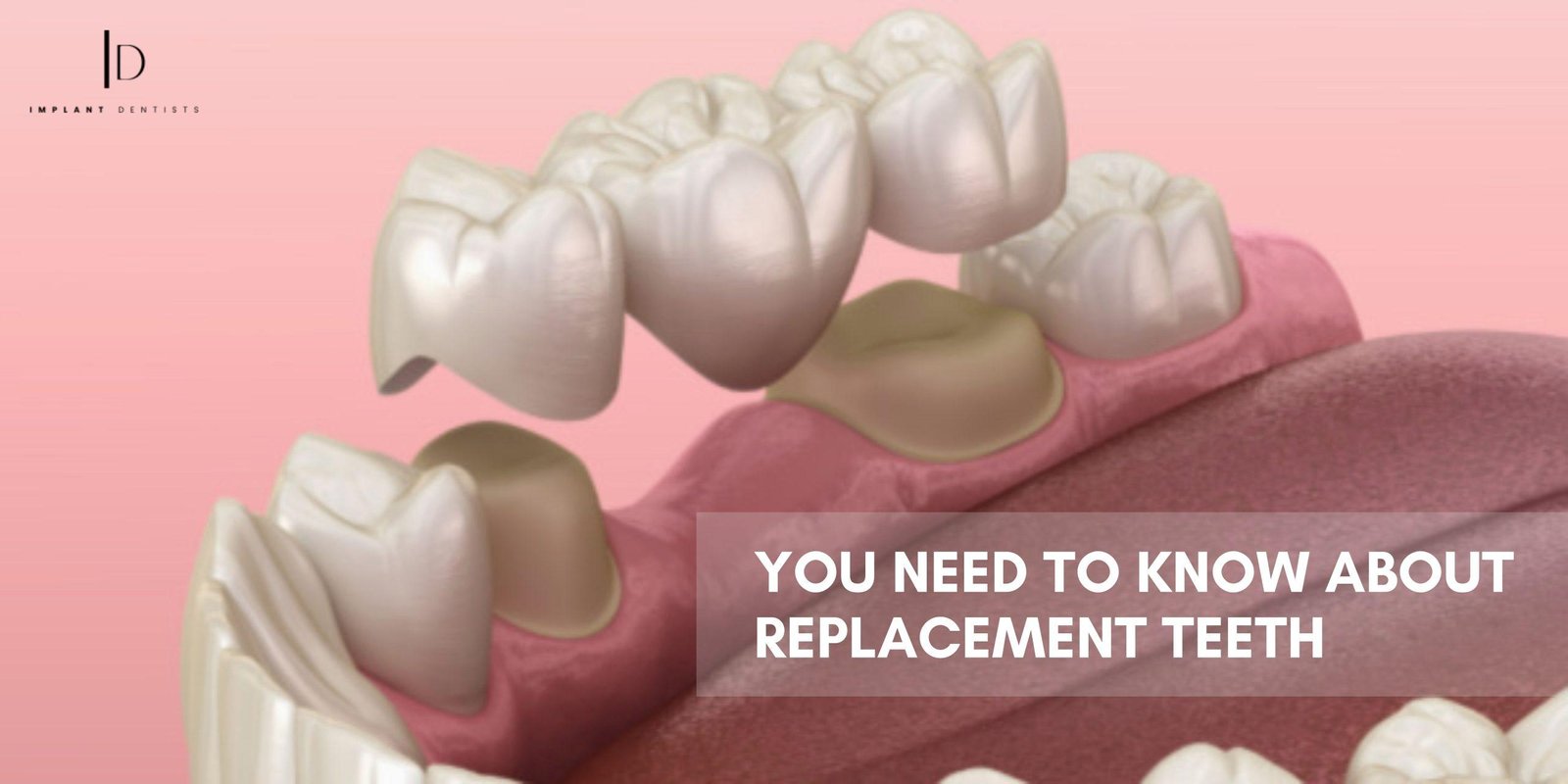
Restoring Your Smile | Everything You Need to Know About Replacement Teeth
February 21, 2024Losing a tooth can be a big deal. It affects not only your appearance but also your ability to eat, speak, and even your self-confidence. Thankfully, modern dentistry offers a variety of options to replace missing teeth and restore your smile to its former glory. Now, we’ll explore the different types of replacement teeth, their pros, and factors to consider when making your decision.
Filling the Gap: Common Types of Replacement Teeth
-
Dental Implants: Considered the gold standard, implants mimic natural teeth the most closely. A small titanium post is surgically placed in your jawbone, acting as an anchor for a crown. Implants are durable, aesthetically pleasing, and function like natural teeth. However, they’re also the most expensive option and require surgery.
-
Dental Bridges: Bridges are fixed restorations that “bridge” the gap left by missing teeth. They consist of artificial teeth attached to crowns cemented onto adjacent healthy teeth. Bridges are strong and natural-looking, but they require preparation of healthy teeth, which may not be ideal for everyone.
-
Dentures: These are removable prosthetics that replace multiple missing teeth. Full dentures cover all teeth in an arch, while partial dentures only fill in specific gaps. Dentures are generally more affordable than implants or bridges, but they may not fit perfectly and can impact speech and eating.
-
Partial Dentures with Implants: Combining implants with dentures offers the best of both worlds. Implants provide stability and prevent bone loss, while the denture fills in the gaps. This option is more expensive than regular dentures but offers superior comfort and function.
Choosing the Right Option: Factors to Consider
- Number of missing teeth: Implants are best for single teeth or multiple spaced apart. Bridges work well for a few consecutive missing teeth. Dentures are suitable for replacing all or most teeth.
- Jawbone health: Implants require sufficient bone mass for placement. Dentures might require bone grafting if bone loss is significant.
- Budget: Implants are the most expensive, followed by bridges, then dentures. Partial dentures with implants are more costly than regular dentures.
- Lifestyle and preferences: Consider your comfort level with removable options, the importance of aesthetics, and your maintenance needs.
5 Pros of Replacing Missing Teeth: Reclaim Your Smile and More!
Losing a tooth isn’t just an aesthetic concern; it impacts your physical and social well-being. Thankfully, modern dentistry offers various solutions to fill the gap and restore your smile’s glory. Beyond regaining that confident grin, here are 5 compelling benefits of replacing missing teeth:
- Eat Like a Champ: Imagine relishing a juicy steak or crunchy apple without struggling. Replacement teeth, especially implants and bridges, mimic natural teeth, allowing you to chew efficiently and enjoy a wider range of delicious foods. Say goodbye to soft diets and rediscover the joy of culinary adventures!
- Speak Clearly and Confidently: Missing teeth can slur your speech, causing self-consciousness and affecting communication. Replacements like dentures or implants improve pronunciation and enunciation, letting you express yourself clearly and confidently in every conversation. Speak your mind without hesitation!
- Boost Your Confidence: A complete smile radiates self-assurance. Replacing missing teeth can drastically improve your self-esteem, empowering you to smile brightly and engage in social interactions without holding back. Let your smile reflect your inner self!
- Protect Your Oral Health: Gaps left by missing teeth create spaces for food debris and bacteria, inviting gum disease and bone loss. Replacements prevent these issues, maintaining the health of your remaining teeth and jawbone. Invest in a healthy smile for the long term!
- Maintain Facial Structure: Missing teeth can cause facial muscles to sag, leading to premature aging and a sunken appearance. Replacements fill the gap, supporting facial tissues and preserving a youthful, healthy look. Age gracefully, not visibly!
Beyond the Basics: Additional Tips
- Consult a dentist: Discussing your individual needs and preferences with a qualified dentist is crucial for choosing the best option.
- Consider long-term implications: While cost might be an initial factor, consider the lifespan and maintenance costs of each option.
- Prioritize oral health: Regular dental checkups and proper oral hygiene are essential for maintaining any type of replacement teeth.
Replacing a missing tooth is a personal decision. By understanding the different options and carefully considering your individual needs, you can restore your smile with confidence and enjoy the benefits of a complete and healthy set of teeth.
Conclusion
Losing a tooth can feel like a loss of confidence and freedom. But fret not! Modern dentistry offers a range of replacement options, each with its own strengths and considerations. This blog served as a compass, guiding you through the different types of replacement teeth, implants, bridges, dentures, and their exciting hybrid – providing an overview of their pros, cons, and suitability based on your unique needs.
Remember, the choice for a replacement tooth is personal. By considering your budget, jawbone health, lifestyle, and aesthetic preferences, you can pave the way for an informed decision alongside your trusted dentist. Don’t let a missing tooth dim your smile – with the right approach, you can reclaim your confidence and rediscover the joy of a complete and healthy set of teeth. So, step out boldly, with a smile that shines brighter than ever!
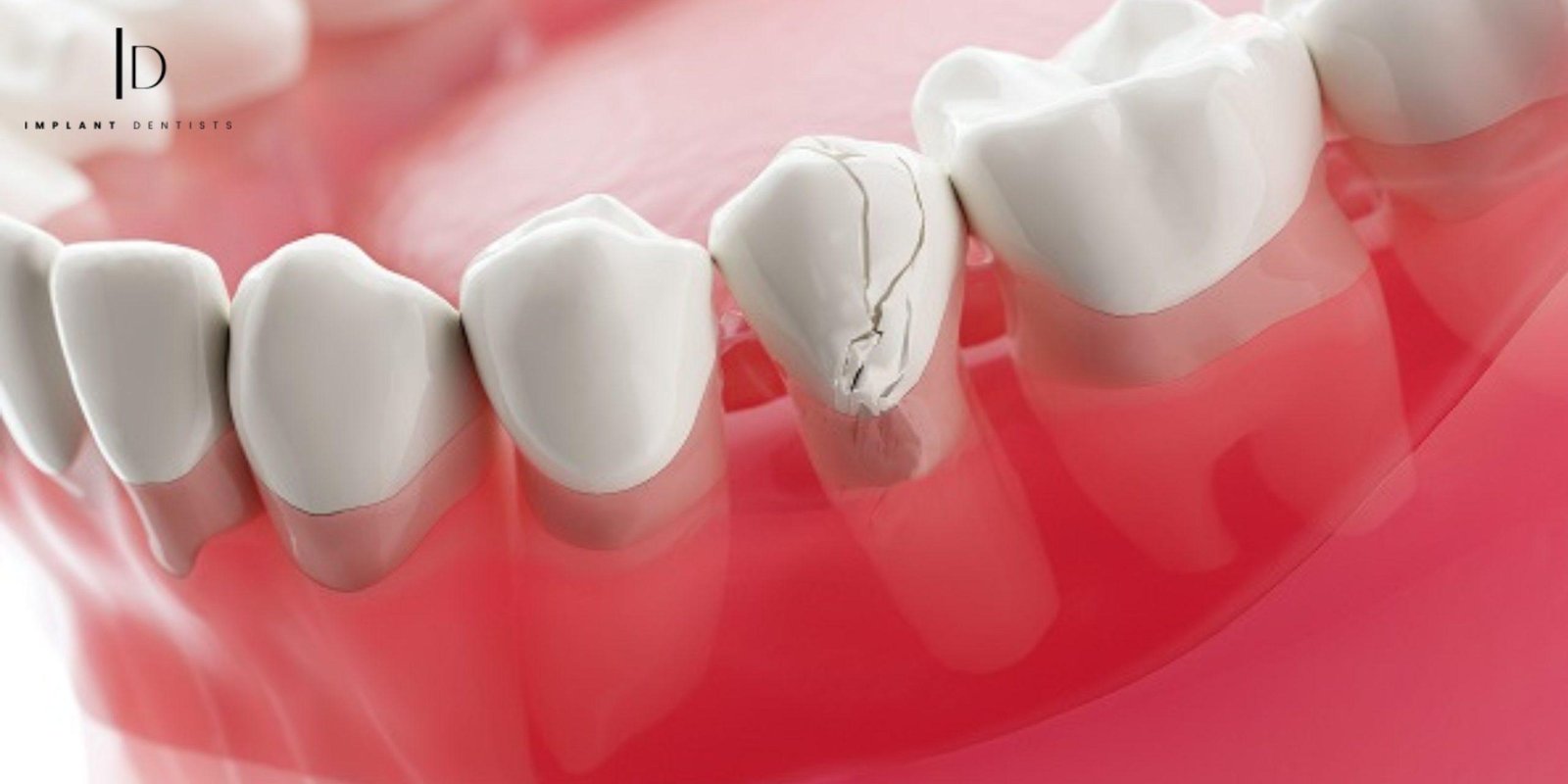
The Complete Guide to Repairing Broken Teeth| Causes, Types, and Treatment Options
February 16, 2024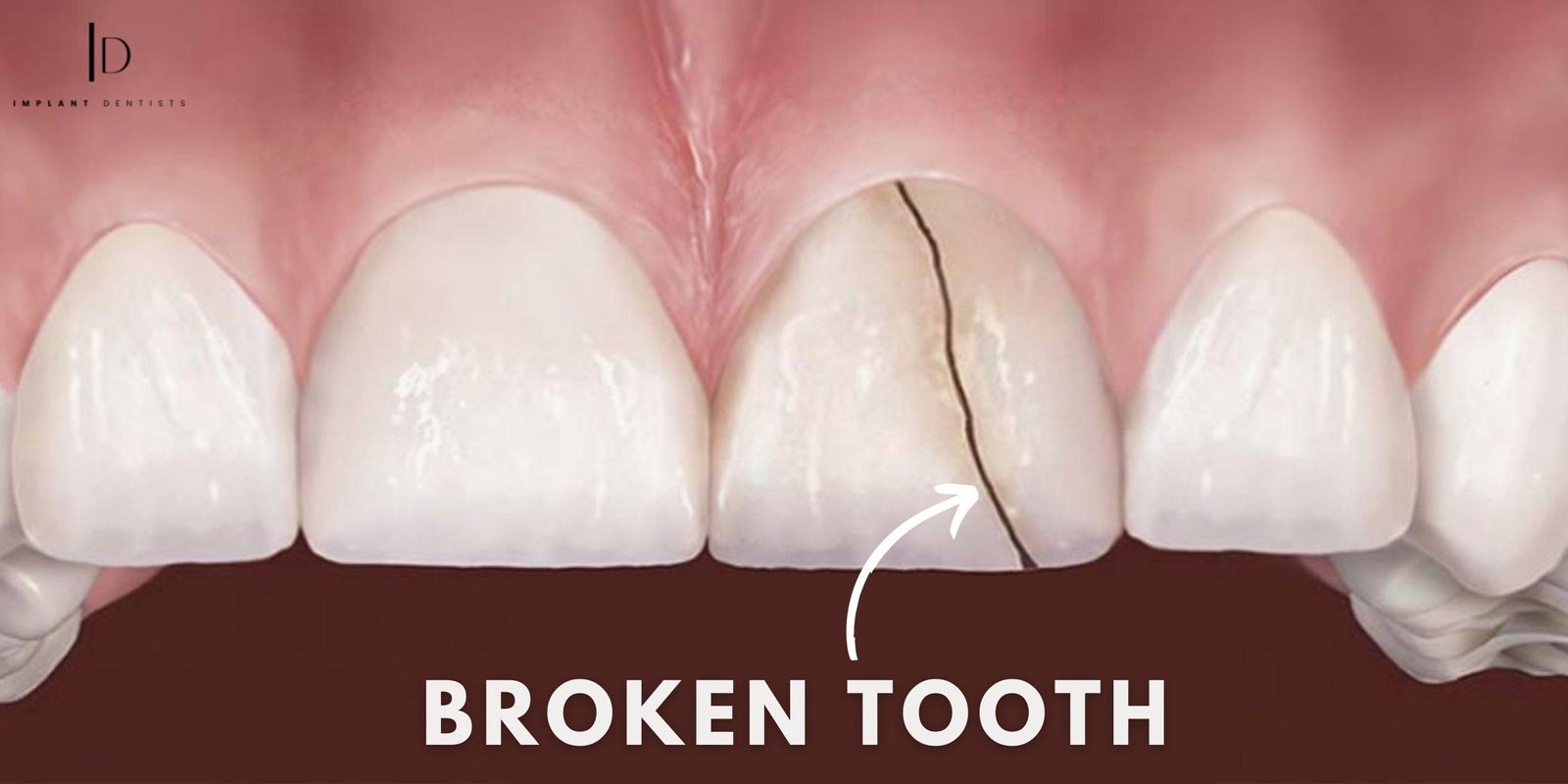
Saving Smiles| Exploring 5 Causes, Treatments & Benefits for Broken Tooth
February 5, 2024A broken tooth can be a worry and painful experience, affecting not just your oral health, but also your confidence in showcasing your smile. Fortunately, advancements in dental care have paved the way for effective broken tooth repair options. Broken tooth repair is a dental procedure designed to restore and renew a damaged or fractured tooth. It brings back functionality to the patient’s smile. Whether the result of an accident, injury, or decay, a broken tooth can cause discomfort, compromise oral health, and impact one’s confidence. Now, we’ll explore the causes of a broken tooth, available treatments, and the benefits of seeking prompt repair.
Causes of Broken Tooth
- Trauma or Injury: Accidents, falls, or sports related injuries can cause direct impact to the mouth, leading to a broken tooth. This can happen during activities like playing sports, falling, or any other situation where the mouth experiences forceful contact.
- Biting on Hard Objects: Chewing on hard substances such as ice, unpopped popcorn kernels, or non food items can lead to tooth breakage. The excessive force applied while biting down on hard objects can cause teeth to fracture or chip.
- Untreated Tooth Decay: Prolonged tooth decay weakens the structure of the tooth, making it more susceptible to breakage. When cavities are left untreated, they can progress and compromise the unity of the tooth, eventually causing it to break.
- Bruxism (Teeth Grinding): Regular teeth grinding, known as bruxism, can apply significant pressure on the teeth, leading to wear and tear. Over time, this constant grinding can weaken the coating and result in fractures or breaks in the teeth.
- Large Fillings or Weak Tooth Structure: Teeth with large fillings or those that have undergone extensive dental work may be more prone to breakage. The presence of a large filling can compromise the structural integrity of the tooth. If the filling is old or poorly done, the tooth becomes more susceptible to fractures.
Five Potential Treatments for a Broken Tooth
- Dental Bonding: Dental bonding is a common treatment for minor tooth fractures. It is often used for fractures caused by trauma or biting on hard objects. In this procedure, a tooth coloured resin is applied to the damaged tooth and then shaped and polished to restore its appearance and function.
- Fillings: If the broken tooth is a result of untreated tooth decay, a dental filling may be used to repair the damage. The decayed portion of the tooth is removed. A filling material is used to fill the cavity and restore the tooth’s structure.
- Dental Crowns: For more extensive tooth damage, such as a large fracture or a weakened tooth structure, a dental crown may be recommended. A dental crown is a custom made cap that covers the entire tooth, providing strength, protection, and restoring its appearance.
- Night Guards for Bruxism: If teeth grinding is the cause of the broken tooth, a dentist may recommend the use of a custom fitted night guard. This oral device is worn while sleeping to cushion the impact of grinding. It prevents further damage to the teeth.
- Root Canal Treatment: In cases where a broken tooth extends into the pulp, a root canal may be necessary. This involves removing the damaged pulp, cleaning and disinfecting the root canal, and then sealing it to prevent infection. After a root canal, a crown is often placed to strengthen and protect the tooth.
Benefits about Broken Tooth Treatment
- Improved Oral Health: Seeking timely broken tooth repair not only relieves pain but also contributes to overall oral health. Addressing fractures prevents the risk of infections and decay that may arise from exposed tooth pulp.
- Enhanced Aesthetics: Dental repairs, such as bonding, crowns, or veneers, go beyond functional benefits. They restore the natural appearance of the tooth. This boosts your confidence and allows you to smile freely without concerns about visible damage.
- Long-term Cost Savings: Investing in broken tooth repair can save you money in the long run. Addressing the issue promptly helps prevent further complications that may require more extensive and expensive dental procedures in the future.
- Restored Functionality: Repairing a broken tooth ensures that you can comfortably chew and eat without discomfort. This restoration of functionality is essential for proper digestion and overall well-being.
- Preservation of Natural Teeth: Certain treatments, like dental bonding and crowns, aim to preserve the natural structure of the tooth. This is advantageous compared to extraction, as it helps maintain the integrity of your natural teeth for as long as possible.
- Boosted Confidence: A healthy, well-maintained smile can significantly impact your self-esteem. By addressing a broken tooth promptly, you improve the physical aspects of your smile. You enhance your mental well-being by feeling more confident and comfortable in social situations. Address a broken tooth promptly to maintain this feeling.
- Customized Solutions: Dental professionals offer a range of repair options tailored to your specific needs. Whether it’s a minor chip or a more extensive fracture, there are personalized solutions that cater to the severity of the damage, ensuring optimal results.
Conclusion
In the journey to broken tooth repair, recognizing the causes is key. Understanding the signs and embracing the available treatment options are also important. Whether your tooth has suffered a minor chip or requires a more extensive restoration, the benefits of timely repair extend beyond pain relief. By promptly addressing a broken tooth, you not only alleviate discomfort but also prevent further damage, ensuring the longevity of your oral health. The array of treatment options, from dental bonding to implants, allows for personalized solutions tailored to your unique situation. Our dedicated dental care team is committed to delivering personalized and effective treatment for broken teeth. They help you regain confidence in your oral health with compassionate care.

Enhance Your Quality of Life with All of Four Implants in the UK
October 16, 2023In a world where appearances matter and confidence is key, your smile can make all the difference. Missing teeth can not only affect your self-esteem but also your overall quality of life. Fortunately, modern dentistry has revolutionized the way we tackle this issue, offering a life-changing solution known as “all of four” dental implants. In the United Kingdom, this innovative treatment has been transforming smiles and enhancing the lives of countless individuals. Let’s explore how all of four implants can significantly improve your quality of life.
Understanding all of four Implants
Before diving into the profound impact of All the Four implants, it’s essential to understand what this dental innovation entails. All of four is a revolutionary approach to dental implants, designed to replace an entire arch of teeth with just four strategically placed implants. Unlike traditional implants, which often require a separate implant for each missing tooth, all of four offers a more efficient and cost-effective solution for those missing a full arch of teeth. This approach ensures a secure, natural-looking smile with minimal implants, significantly reducing the overall treatment time and recovery period.
The Confidence Boost
One of the most immediate and noticeable benefits of All the four implants is the confidence they restore. Living with missing teeth can lead to a host of emotional and psychological issues, including reduced self-esteem and self-assurance. The embarrassment of gaps in your smile can make you hesitant to engage in social situations or even smile for photographs. All the Four implants provide a permanent solution, giving you a new, attractive smile that feels and looks natural. This transformation can boost your self-confidence, allowing you to face the world with a renewed sense of self-worth.
Improved Speech and Functionality
Missing teeth not only affect your appearance but also your oral functionality. Chewing, speaking, and even enunciating words can become challenging with gaps in your teeth. All the Four implants restore your ability to eat and speak comfortably, just as you would with a set of natural teeth. This improved functionality enhances your quality of life by enabling you to enjoy a more varied diet, speak clearly, and engage in social interactions without any inhibitions.
Enhanced Oral Health
All the Four implants do more than just replace missing teeth; they also promote better oral health. The implants provide the necessary stimulation to the jawbone, preventing bone loss that often occurs when teeth are missing. This ensures the longevity of your facial structure and oral health. Moreover, the easy maintenance of All the Four implants—just like natural teeth—means you can maintain good oral hygiene practices without any additional hassle.
Time and Cost Efficiency
Compared to traditional dental implant treatments, All on four offers significant time and cost savings. Traditional implants can require multiple procedures, prolonged healing times, and more visits to the dentist. In contrast, All the four implants require minimal appointments and have a shorter recovery period. The efficiency of this treatment not only reduces your overall cost but also minimizes the time you spend in the dental chair.
Choosing all of four Implants in the UK
The United Kingdom boasts a thriving dental industry, and all of four implants are readily available in the country. To enhance your quality of life through this innovative dental solution, you should consult with a qualified dentist who specializes in all of four implants. They will conduct a thorough assessment of your dental health and help you determine if you are a suitable candidate for this procedure.
In conclusion, all of four dental implants in the UK offer a life-changing solution for those struggling with missing teeth. These implants provide a renewed sense of confidence, improved functionality, better oral health, and cost-effective treatment. If you’re looking to enhance your quality of life, all of four implants may be the solution you’ve been searching for. Say goodbye to missing teeth and hello to a brighter, more confident you!
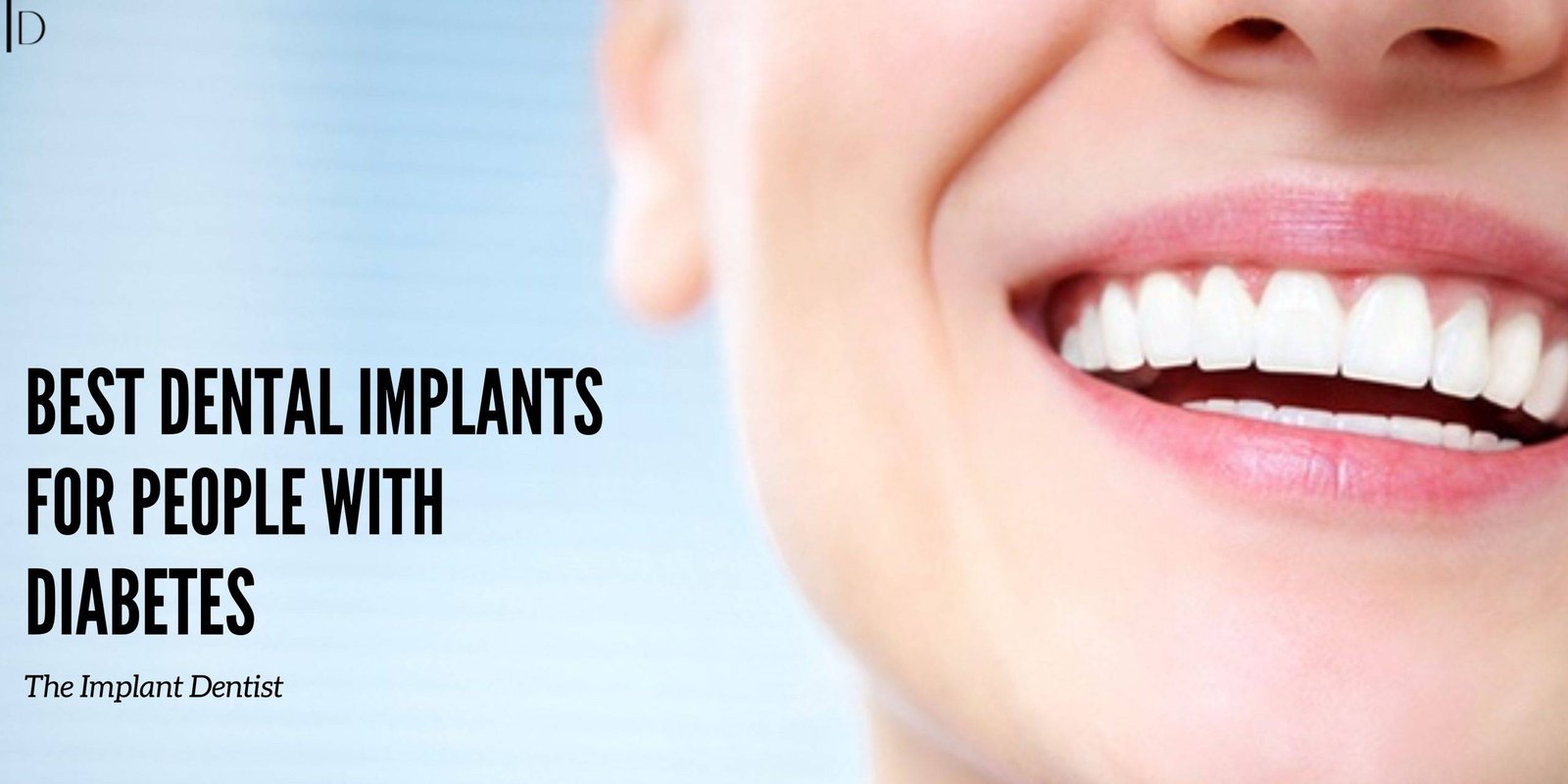
The Best Dental Implants for People with Diabetes
October 11, 2023Living with diabetes can present various challenges, and dental health is no exception. People with diabetes need to pay extra attention to their oral health, as they are at a higher risk of dental problems, including tooth loss. Dental implants have become a popular solution for replacing missing teeth. But are they a suitable option for individuals with diabetes? In this post, we’ll explore the best dental implant options for people with diabetes, addressing the unique considerations and options available.
Understanding Diabetes and Dental Health
Before we delve into the best dental implant options, it’s essential to understand how diabetes can impact oral health. Diabetes can affect the body’s ability to fight infections and heal properly, increasing the risk of dental issues. High blood sugar levels can also lead to:
- Gum Disease: Diabetes makes individuals more susceptible to gum disease (periodontitis). This can lead to the loss of teeth and, ultimately, the need for dental implants.
- Dry Mouth: Diabetes can cause dry mouth, reducing the production of saliva that helps protect teeth. Dry mouth can lead to cavities and dental implant complications.
- Delayed Healing: Individuals with diabetes may experience slower wound healing, which is a crucial aspect of successful dental implant procedures.
- Nerve Damage: Diabetes can cause nerve damage in the mouth, reducing the ability to detect dental problems early.
The Best Dental Implants for People with Diabetes
When it comes to dental implants, several factors should be considered when choosing the best option for individuals with diabetes. Here are some options to consider:
- All-on-4 Dental Implants: All-on-4 implants are an excellent choice for many people with diabetes. This system involves placing four dental implants to support an entire arch of teeth. Since it requires fewer implants and minimizes the risk of infection, it can be an efficient and safe option for diabetic patients.
- Zirconia Implants: Zirconia dental implants are made from a biocompatible, tooth-coloured material. These implants are hypoallergenic and resistant to corrosion, which can be advantageous for individuals with diabetes, as they are more susceptible to infections and allergic reactions.
- Mini Dental Implants: Mini dental implants are a smaller version of traditional implants and are less invasive. They can be a suitable choice for individuals with diabetes who may have a slower healing process, as they require less downtime and have a lower risk of complications.
- Guided to Implant Surgery: Precision is crucial in dental implant surgery for diabetic patients. Guided to implant surgery, which utilizes advanced technology to plan and execute the procedure with the utmost accuracy, can reduce the risk of complications and improve the chances of successful implant integration.
- Good Oral Hygiene Practices: Regardless of the type of dental implant chosen, maintaining excellent oral hygiene is essential for people with diabetes. Regular dental check-ups, daily brushing and flossing, and managing blood sugar levels are crucial for the long-term success of dental implants.
Conclusion
Dental implants are a viable solution for people with diabetes who have lost teeth or are at risk of tooth loss. However, the choice of implant type and the surgical approach should be carefully considered minimizing risks and ensure long-term success. It’s essential for individuals with diabetes to work closely with their dentist or oral surgeon to create a personalized treatment plan that takes their unique medical condition into account. With the right approach and proper care, the best dental implants can provide a durable and natural-looking solution to restore a beautiful smile and overall oral health for people with diabetes.
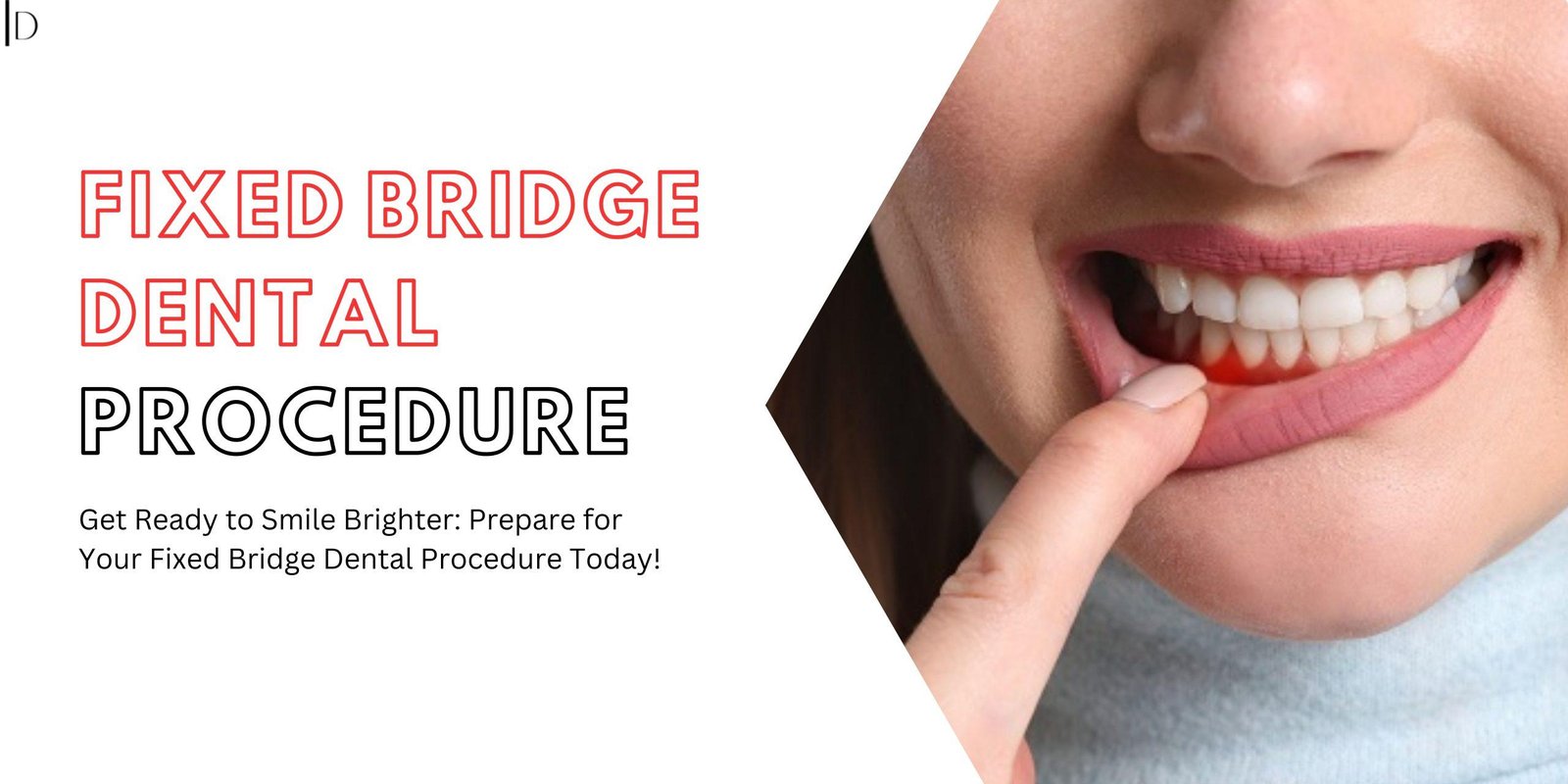
How to Prepare for a Fixed Bridge Dental Procedure
September 18, 2023If you’re scheduled for a fixed bridge dental procedure, you might be wondering how to best prepare for it. Fixed bridges are an effective solution for replacing missing teeth, restoring your smile, and improving your oral health. To ensure a smooth and successful dental experience, it’s essential to be well-prepared. In this guide, we’ll walk you through the steps to prepare for your fixed bridge dental procedure.
Consultation with Your Dentist
Before undergoing any dental procedure, it’s crucial to have an initial consultation with your dentist. This consultation serves several purposes:
- Assessment of Your Dental Health: Your dentist will examine your mouth and assess the condition of your teeth and gums. This evaluation helps determine if a fixed bridge is the right solution for you.
- Discussion of Treatment Plan: Your dentist will explain the treatment plan, including the type of bridge (traditional or implant-supported), the number of missing teeth to be replaced, and the estimated duration of the procedure.
- Cost and Insurance: The consultation is an opportunity to discuss the cost of the procedure, available payment options, and whether your dental insurance covers any part of the treatment.
Dental X-Rays and Impressions
To prepare for your fixed bridge dental procedure, your dentist will likely take dental X-rays and impressions of your teeth. This step is essential because it provides precise information about the structure and condition of your mouth:
- X-Rays: Dental X-rays help your dentist visualize the underlying bone structure and assess the health of adjacent teeth. This information is crucial for designing a bridge that fits perfectly.
- Impressions: Impressions of your teeth help create an accurate mould for the bridge. This ensures a comfortable and secure fit once the bridge is in place.
Oral Hygiene and Gum Health
Good oral hygiene is essentially both before and after your fixed bridge dental procedure. Here’s how to prepare in this aspect:
- Brush and Floss: Maintain a rigorous oral hygiene routine by brushing your teeth at least twice a day and flossing daily. Clean and healthy teeth and gums provide a better foundation for the bridge.
- Gum Health: Pay attention to your gum health. If you notice any signs of gum disease, such as redness, swelling, or bleeding, inform your dentist. Healthy gums are essential for the long-term success of your fixed bridge.
Preoperative Instructions
Your dentist will provide you with specific preoperative instructions to follow in the days leading up to your fixed bridge dental procedure. These instructions may include:
- Dietary Restrictions: You might be advised to avoid certain foods and drinks, especially alcohol and caffeine, in the hours before the procedure.
- Medication: If you are on any medications, your dentist will discuss whether you should continue taking them as usual or make adjustments.
- Arrangements for Transportation: If you will be receiving sedation or anaesthesia during the procedure, arrange for someone to drive you home afterward.
Questions and Concerns
Before the day of the procedure, make sure to ask any questions or express any concerns you may have. Open communication with your dentist is vital for a successful outcome.
The Day of the Procedure
On the day of your fixed bridge dental procedure, arrive at the dental office on time and follow any additional instructions provided by your dentist or their team. Be prepared to relax and trust in the expertise of your dental care professionals.
Conclusion
Preparing for a fixed bridge dental procedure involves a combination of careful planning, good oral hygiene, and clear communication with your dentist. By following the steps outlined in this guide, you’ll be well-prepared to undergo this dental procedure and look forward to the benefits it brings, such as improved oral health and a more confident smile. Remember that your dentist is your partner in this journey, so don’t hesitate to ask questions and share any concerns you may have.

Achieving the Perfect Smile: The Implant Dentists’s Comprehensive Guide
September 4, 2023Our mission is to provide you with the most detailed and informative resource on dental health and cosmetic dentistry, helping you understand the importance of a confident smile and how to attain it. In this article, we’ll cover a wide range of topics, from common dental issues to the latest advancements in cosmetic dentistry, ensuring that you have all the information you need to make informed decisions about your dental health.
Understanding Dental Concerns
Dealing with Teeth Imperfections: Are you hiding your teeth due to imperfections? We understand how dental issues can impact your self-esteem. From crooked teeth to discolouration, there are various concerns that can affect the appearance of your smile. At The Implant Dentists, we believe that everyone deserves a radiant smile, and there are solutions available for every issue.
The Impact of Missing Teeth: One of the most common dental concerns is missing teeth. This can not only affect your confidence but also your oral health. Missing teeth can lead to jawbone deterioration and shifting of remaining teeth. We’ll explore the consequences of missing teeth and the innovative dental implant solutions available at The Implant Dentists.
Comprehensive Solutions
Dental Implants – The Permanent Solution: At The Implant Dentists, we specialize in dental implants – the gold standard for replacing missing teeth. Dental implants are surgically placed in your jawbone, providing a strong and stable foundation for artificial teeth. Unlike traditional dentures, dental implants look and function like natural teeth, allowing you to smile, eat, and speak with confidence.
Smile Makeovers – Transforming Your Appearance: If you’re looking to enhance your smile further, consider our smile makeover services. Our team of experienced cosmetic dentists can address various concerns, including teeth whitening, veneers, and orthodontic treatments. We’ll help you achieve a flawless and stunning smile that boosts your self-esteem.
Innovative Techniques
Advanced Technology for Precision: To ensure the best results, The Implant Dentists employs cutting-edge dental technology. From 3D imaging for implant placement to laser teeth whitening, we use the latest techniques to provide safe and effective treatments. Our commitment to innovation sets us apart in the world of cosmetic dentistry.
Pain-Free Procedures: We understand that dental anxiety is a common concern. That’s why we offer pain-free procedures, ensuring that your experience at The Implant Dentists is as comfortable as possible. Our sedation options and gentle techniques guarantee a stress-free visit to our clinic.
Your Journey to a Perfect Smile
Consultation and Treatment Planning: Your journey to a perfect smile starts with a consultation at The Implant Dentists. During this initial visit, our experts will assess your dental health, discuss your goals, and create a personalized treatment plan tailored to your needs.
Exceptional Patient Care: Our commitment to excellence extends beyond our treatments. At The Implant Dentists, we prioritize exceptional patient care. Our friendly and knowledgeable staff are here to guide you through every step of your dental transformation, ensuring your comfort and satisfaction.
Conclusion
In conclusion, The Implant Dentists is your premier destination for achieving the perfect smile you’ve always dreamed of. With our comprehensive solutions, innovative techniques, and unwavering commitment to patient care, we are confident that we can help you outrank the competition in terms of dental health and cosmetic dentistry. Say goodbye to hiding your teeth and hello to a confident, radiant smile with The Implant Dentists. Contact us today to embark on your journey to dental excellence.
